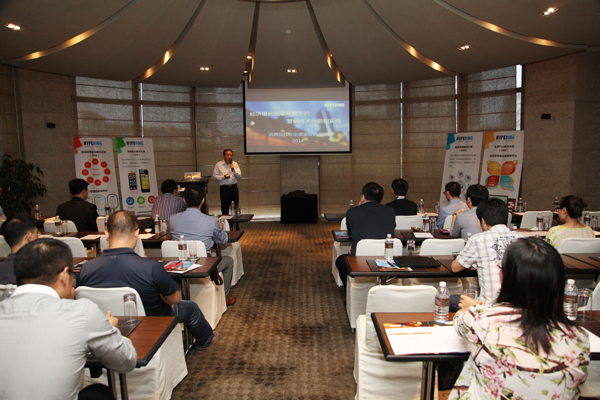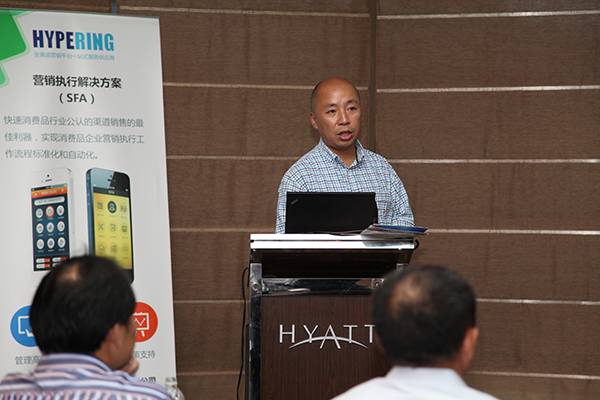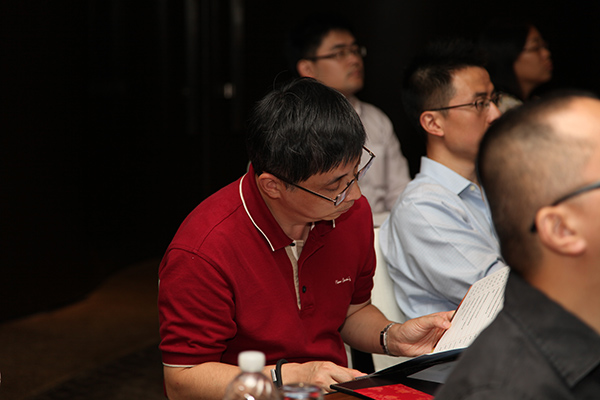On September 5, 2014, “Online to Offline Marketing Salon of the Consumer Products Industry 2014” sponsored by Hypering (www.hypering.com.cn) was held at Hyatt on the Bund of Shanghai. The guests included the representatives from Shanghai Jahwa, Unilever, Inoherb, L'Oreal, Mondelez, Vitasoy, Wall’s, Johnson & Johnson China, Schneider Electric, Stanley Black & Decker, and other representatives from the consumer products enterprises.

Hypering specially invited Mr. Sun Hao, IT Director of Shanghai Jahwa Group, who used to work for Unilever with 20 years of experience in the FMCG industry and IT management. He led the IT information construction that promoted the annual sales to develop from tens of millions to billions level, equipped with extensive experience in brand marketing innovation and management

He put forward such kind of viewpoint in this salon:
There would be no enterprise more familiar with the relationship between business transformation and information technology. In the past three years, this enterprise experienced a change in IT.
“People often seek in vain the transformation brought about by IT system. In fact, IT system does not mean anything, and you need to prepare for these changes for a long time.” said Sun Hao, deputy director of Information Management Department of Jahwa. Although the completed implementation of EPR system in the end of 2007 indicated great significance, before this change, what they had done the most was the complete project planning, the ongoing IT policies and cultural transformations, all of which were precisely the key measures taken to promote the success of ERP.
For example, he said, a department starts to change little by little due to different management styles brought by the supervisor with his previous experience. “Such change cannot be seen immediately but after the implementation of a project.” And there is no exception for the IT sector.

Company changes
The earliest change came from the IT team. At that time, all branches of Jahwa had no IT team. Concentrated in headquarters, the IT department was often busy developing some simple procedures or maintaining system, and, thus, had no time dealing with the centralized control of business and other issues on a higher level. In terms of planning, Jahwa, at first, by no means “supported” ERP, but gave priority to the BI construction which was deemed by other enterprises as the late-stage application of information construction, which is inseparable with Wang Zhuo’s deep understanding of BI and which is somewhat surprising.
According to another person in charge of the IT department, the reason to introduce BI is to make people familiar with what the system looks like, be it “fat” or “thin”, and, at least, to provide convenience for them. Actually, the reason is that although the previous business system of Jahwa lacks interconnection, the huge business data inventory of each system is equipped with exploration and utilization value. In addition, the IT department expects that the BI applications can draw the attention of the management level to the value of data, and, eventually, lead to the construction of ERP, CRM and other application systems. However, the story is completely different for Jahwa, which involves the introduction of the department supervisors as well as the recruitment of younger workers. With the active management styles of these supervisors, almost every department is changing. The state-owned enterprise, which used to leave a dilatory and inefficient impression on people’s mind, is transforming gradually. The IT departments begun to turn to the data maintenance, system maintenance and other routine work. Moreover, the perfect governance mechanisms are formed in all aspects of IT services, project implementation, etc. The original work of procedure development and system maintenance began to be classified as secondary work. At the same time, the IT department established a customer-oriented service system, through which the operational staff can go directly to their customer service supervisor to deal with any problems that are encountered. One-stop services are provided for the employees who can have their problems solved by the customer service supervisors in collaboration with others. Agreement on IT support and services has been reached between the IT department and various business departments. However, it does not mean the end of ERP. They start to focus on KPI (key performance indicator). Currently, each subsidiary can see the same data, which exerts a motivating influence on the work of each company. Sun Hao revealed that, based on KPI, the next step of the IT department will be to establish a data warehouse. All projects are executed in accordance with the original plan. The change from the IT department is that all IT staff have changed now and they all have a clear understanding of their work objectives and responsibilities. Form this point, the significance of the implementation of a project is far greater than the system itself. Gradual and continuous improvement. As a gradual process, information construction can neither be accomplished in one step nor achieve immediate success. After construction, it cannot be invariable and need to be improved and optimized according to demands. During the implementation of the ERP system, in accordance with the requirements of planning, Jahwa sustains progress, continues to invest and constantly improves the system, making the system more rational and optimized and further developing the performance of the information system.
Information construction interacts with business transformation. Information construction needs to be supported by sound information atmosphere and culture; the favorable effect of information construction will also promote business transformation, making enterprises produce sound information culture and innovation culture. This kind of interaction is reflected in the ERP implementation of Jahwa. IT can solve the practical problems of business activities, achieve the transformation of business processing mode, and bring new opportunities for business development!
“Online to Offline Marketing Salon of the Consumer Products Industry” is the small meeting and salon activity introduced by Hypering, designed to build the communication and exchange platform for enterprises, timely and objectively investigate the new changes and new ideas of FMCG industry through short and relaxing salons, and probe into the questions of how to utilize these new products and services to innovate marketing and improve its effect.
Hypering is dedicated to creating “one-stop service for online to offline marketing platform” and providing consultation, solutions, products and services for marketing management and channel management.
“Trade promotion management (TPM)”, “Sales force automation (SFA)”, “Member POS solutions (CRM)”, “Distributor management system (DMS)”, “Data integrated management (DIS)” and “Online to Offline (O2O)” are the best marketing expenses control solutions in the FMCG industry.
|
